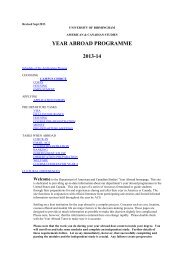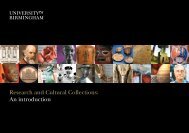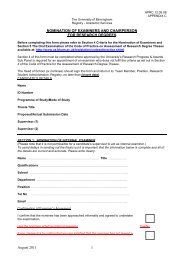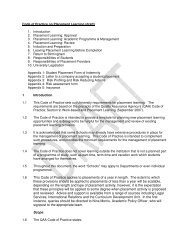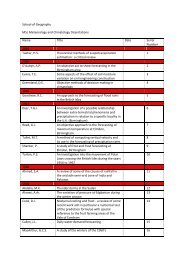reimagining-abstracts - University of Birmingham
reimagining-abstracts - University of Birmingham
reimagining-abstracts - University of Birmingham
Create successful ePaper yourself
Turn your PDF publications into a flip-book with our unique Google optimized e-Paper software.
eflection <strong>of</strong> the German sociologists M.Weber and W.Sombart, who argued that the<br />
beliefs, the ideas and the meaning that people give to their actions are very important<br />
in order to study a society; the method that is going to be applied is the classic<br />
thematic analysis <strong>of</strong> discourse.<br />
Anastasia Siopsi<br />
siopsi@ionio.gr<br />
The birth <strong>of</strong> music out <strong>of</strong> the spirit <strong>of</strong> tragedy: On the role <strong>of</strong> music<br />
in productions <strong>of</strong> ancient drama in twentieth-century Greece<br />
The main purpose <strong>of</strong> this paper is to <strong>of</strong>fer readings <strong>of</strong> the ways that Greek composers<br />
depict ‘images’ <strong>of</strong> Greece in music for stage productions <strong>of</strong> ancient dramas and<br />
comedies in twentieth-century Greece, by taking into account the broader attitudes <strong>of</strong><br />
Greek archeology and <strong>of</strong> how Greeks view their past.<br />
In modern Greece <strong>of</strong> the first decades <strong>of</strong> the twentieth century, the<br />
predominant notions <strong>of</strong> ‘Hellenism’, or ‘greekness’, interpret Greek history as an<br />
uninterrupted evolution from the classical past to Byzantium. In terms <strong>of</strong> music,<br />
continuity was believed to be found from ancient Greek music to Byzantine hymns<br />
and folk songs. This theory, supported by important scholars and composers like<br />
George Pachtikos and Ioannis Sakellaridis who wrote music for productions <strong>of</strong><br />
ancient dramas at that era, was also encouraged by foreign intellectuals such as Louis-<br />
Albert Bourgault-Ducoundray. The incorporation <strong>of</strong> folk songs and Byzantine modes<br />
into the musical means <strong>of</strong> narration became a central compositional practice for a<br />
large part <strong>of</strong> music written for ancient dramas throughout the twentieth century, with<br />
or without nationalistic undertones.<br />
Music written for productions <strong>of</strong> ancient drama in modern Greece distanced<br />
itself from the mainstream <strong>of</strong> European operatic tradition. Productions <strong>of</strong> ancient<br />
drama and comedy in twentieth-century Greece, as I will attempt to prove,<br />
deliberately and systematically avoided the adaptation <strong>of</strong> operatic forms. Also,<br />
symphonic music in productions <strong>of</strong> ancient dramas was introduced as early as the<br />
interwar period. However, characteristics like folk tradition and byzantine music, nonwestern<br />
elements, a more lyrical approach due to respect <strong>of</strong> the words, the use <strong>of</strong><br />
magnetic tapes and electronic sounds and other experimental approaches formed<br />
alternative approaches to ancient drama as musical theatre, especially from 1960s<br />
onwards, by important composers like Jani Christou, Jannis Xenakis, Theodoros<br />
Antoniou, Argyris Kounadis, Giorgos Kouroupos and so forth.<br />
Anastasia Stouraiti<br />
a.stouraiti@gold.ac.uk<br />
Greek Antiquaries and Archaeological Knowledge in Early Modern<br />
Venice<br />
Current research on the emergence <strong>of</strong> archaeology in modern Greece has largely left a<br />
blind spot around the period preceding the formation <strong>of</strong> the Greek nation-state. On the<br />
one hand, traditional historians imply that Ottoman-ruled Greeks directly identified<br />
with antiquities through notions <strong>of</strong> continuity with the ancient Greek civilisation.<br />
Against these assumptions, other studies have argued that early modern Greeks<br />
regarded antiquities as alien artefacts belonging to the realm <strong>of</strong> legend, and that<br />
contact with European neoclassicism and the rise <strong>of</strong> Greek nationalism since the<br />
eighteenth century reversed this perception.<br />
24




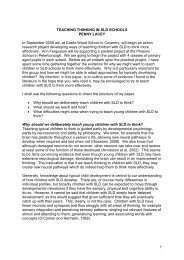
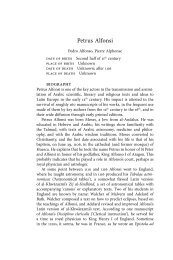
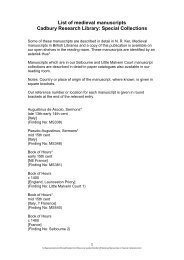
![Benyamin Asadipour-Farsani [EngD Conference abstract]](https://img.yumpu.com/51622940/1/184x260/benyamin-asadipour-farsani-engd-conference-abstract.jpg?quality=85)


